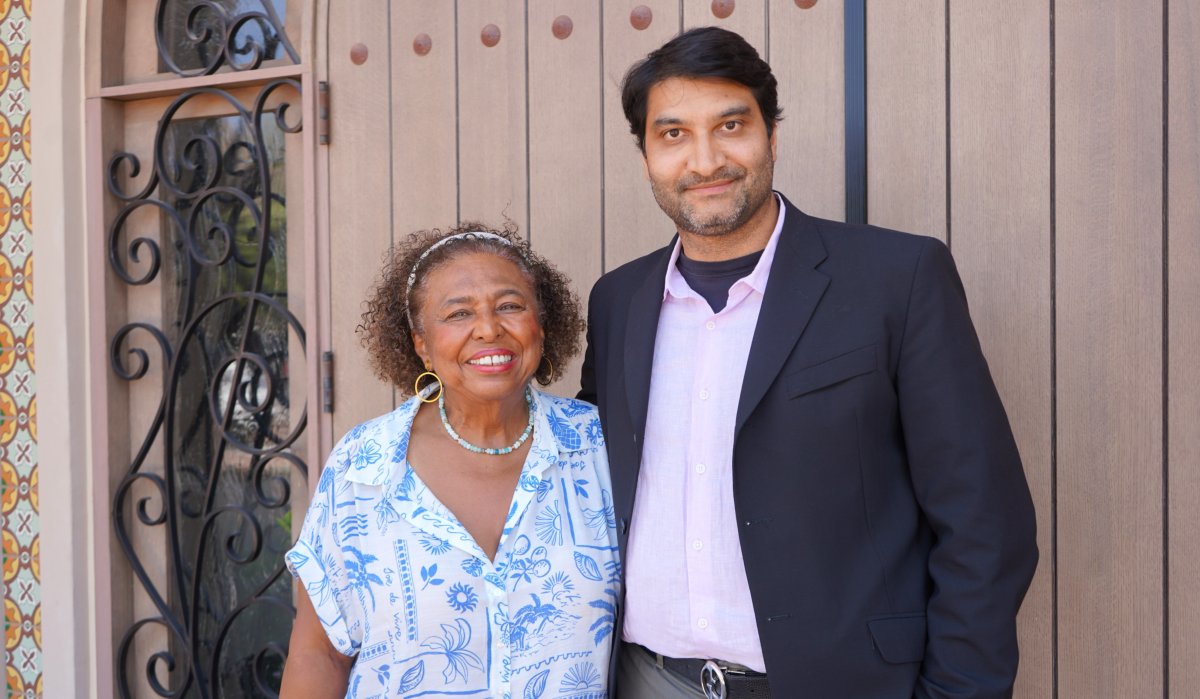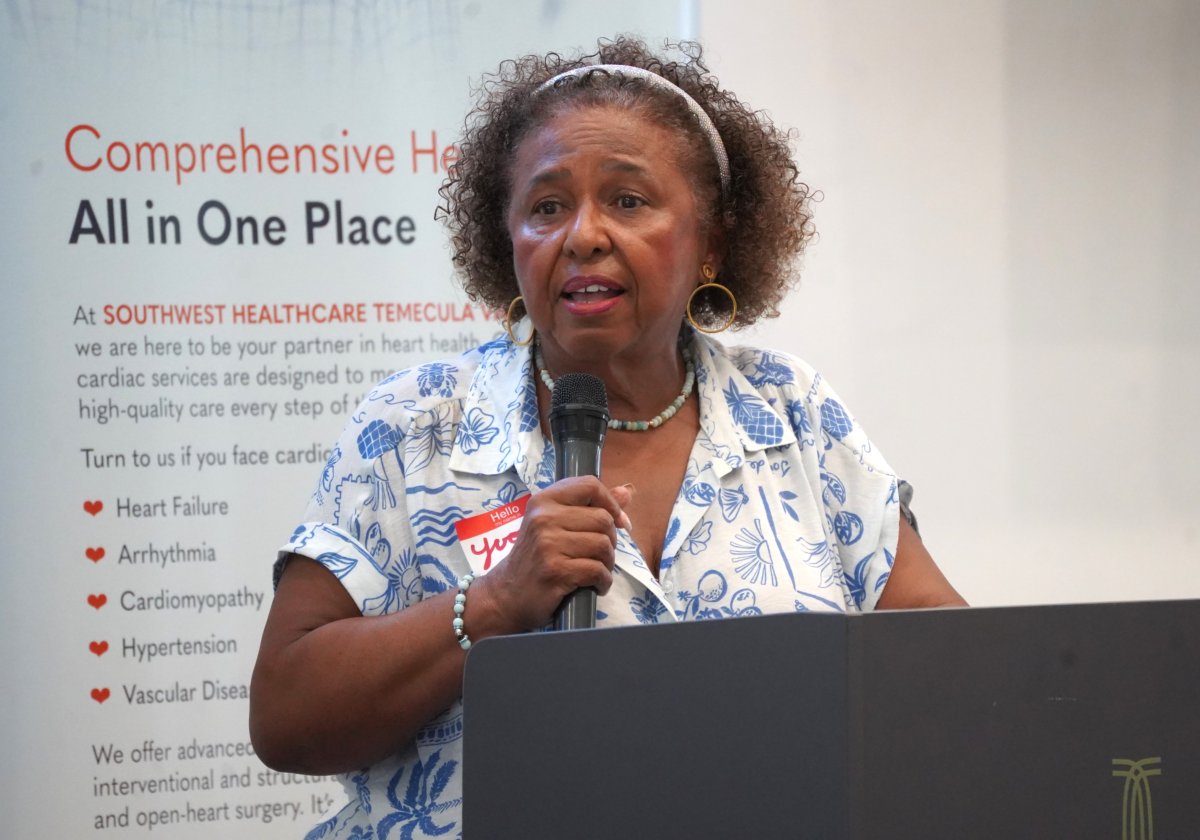“No pain, no warning – I was going to take a nap.” – Yvonne Sanusi

April 19, 2025 started as an ordinary Saturday morning. Yvonne Sanusi and her partner were enjoying coffee and conversation after celebrating his birthday the night before. She decided to take a nap, settling into the comfort of her garden room with a pillow, thinking, “This is really comfortable.”
The next thing she remembers was completely surreal—she was on a gurney, being placed into an ambulance. The warmth of the sun on her face felt almost dreamlike. “I was thinking what a vivid dream I was having, with voices talking to me, but then I heard the siren, and that brought me back to reality,” says Yvonne. “Those voices were paramedics asking me my name, the date, and it became clear this was not a dream at all.” Something had happened, and she had no memory of it.
Yvonne’s partner had discovered her unresponsive on the floor after hearing a loud thump. He quickly checked her pulse—nothing. Staying calm, he turned her over and performed CPR for about two minutes before calling 911. Moments later, she began coughing and gurgling. Emergency responders arrived and rushed her to Southwest Healthcare Inland Valley Hospital.
A process of elimination
After an initial evaluation, Yvonne was transferred to Southwest Healthcare Temecula Valley Hospital (TVH), recognized for excellence in providing high-quality heart failure, heart attack, and stroke care. The medical team worked to understand what had happened. There was no distress before the incident, no warning signs. Neurological tests ruled out brain damage or bleeding. Interventional Cardiologist Niraj V. Parekh, MD, performed an angiogram to make sure there were no blockages in Yvonne’s heart. Through a process of elimination, they arrived at the diagnosis: cardiac arrest.
After reviewing her records, doctors believed her cardiac arrest was triggered by medication she had been taking, which affected her heart’s rhythm. In consulting with specialists, Yvonne had a choice – to wear an external life vest, or have an implantable defibrillator—a device that, unlike a pacemaker, doesn’t just regulate heartbeat but restarts the heart when it stops.
“I met with Electrophysiologist Bradley Messenger, MD, and discussed my options with him, Dr. Parekh, and my family. I qualified for it, and it fit better with my active lifestyle. Ultimately, we decided to have the implantable defibrillator,” she says. “It was an easy decision and they did it right there at TVH.”
CPR and quick action saved her life
Reflecting on the experience, Yvonne remains shocked by how sudden and silent cardiac arrest can be. “There was no pain, no warning,” she says. “I went from thinking I was going to take a nap, to waking up in an ambulance. That’s the scary part.”
“The statistics are just frightening,” Yvonne shares. “Less than 10% of people survive cardiac arrest outside of a hospital. For African American women, it’s under 5%. That was hard to hear, knowing that I had beaten the odds. I looked it up myself—I had to know the reality of it,” she says.
Yvonne is grateful for the quick action of her partner, who kept calm and performed CPR when she needed it most. “He said he was terrified, but he had the presence of mind to check my pulse, turn me over, and start chest compressions. That saved my life,” she says. “But the initial care I received at Inland Valley, and then deciding to transfer me to TVH for more advanced cardiac care, it was all amazing,” she says.
Excellent, advanced cardiac care
“TVH is a comprehensive cardiovascular center, and once Yvonne saw the capabilities, she changed her whole mindset,” explains Dr. Parekh. “TVH has become like a teaching center, with a faculty model, a dedicated heart team, electrophysiologist, and more. These services were not available 10 years ago. We are doing minimally invasive procedures now and making the community aware of our capabilities.”
Yvonne says she has always searched out university hospitals to receive her care and the thought of having something serious done at a non-university hospital never occurred to her. “It came down to educating myself, and I learned that I could get a great level of care, and in some ways, better care, closer to home,” she says. “I live in a senior community, and to have a local hospital with that level of care is incredible. My community is not aware that we have a top-level hospital within 30 minutes of us.”
Educating the community
 As she moves forward, Yvonne is focused on recovery and raising awareness. “It’s hard to process what happened,” she admits. “But I want people to understand how important CPR is. I wouldn’t be here if my partner hadn’t known what to do.”
As she moves forward, Yvonne is focused on recovery and raising awareness. “It’s hard to process what happened,” she admits. “But I want people to understand how important CPR is. I wouldn’t be here if my partner hadn’t known what to do.”
Her story is not just one of survival—it’s a testament to the lifesaving power of CPR, swift medical response, and resilience. And now, Yvonne is sharing her experience, ensuring that more people understand the importance of emergency preparedness.
“To raise more awareness of TVH’s capabilities and how CPR can save lives, I set up a workshop at my community center and asked Dr. Parekh to do a presentation so we can educate people,” she says. “We had 80 people sign up! And we think we will now do these quarterly, to help educate more people and raise awareness of CPR, and the excellent medical care we have available not far from us.”
Yvonne says the area is growing faster than they realize, and she feels it is very important to have doctors like Dr. Parekh and Dr. Messenger at TVH. “Dr. Parekh is a very dedicated, approachable, and brilliant young man. And Dr. Messenger called me personally to follow up with me after the procedure. I see them both for my follow-up care, and at my latest appointment, my test results were where they need to be. That is a testament to getting excellent medical care!”
Yvonne says she, her family, and her friends are very, very grateful. She feels she got a new lease on life, and she has an extremely optimistic outlook for her cardiac care. “I am convinced I have great heart health now because of all of this intervention,” she says. “Finding out you have a cardiac problem can be a downer, but educating yourself and getting the right doctors can put you in the better frame of mind, body, and spirit.”
